Insights | Togo’s National Roadmap for Reducing SLCP Emissions in Solid Waste & The Action Plan for Greater Lomé
- Recycle Organics

- Aug 12, 2025
- 8 min read
Updated: Oct 9, 2025
Toward Cleaner and sustainable Solid Waste Systems: Togo’s strategies for SLCP Reduction & Urban Action
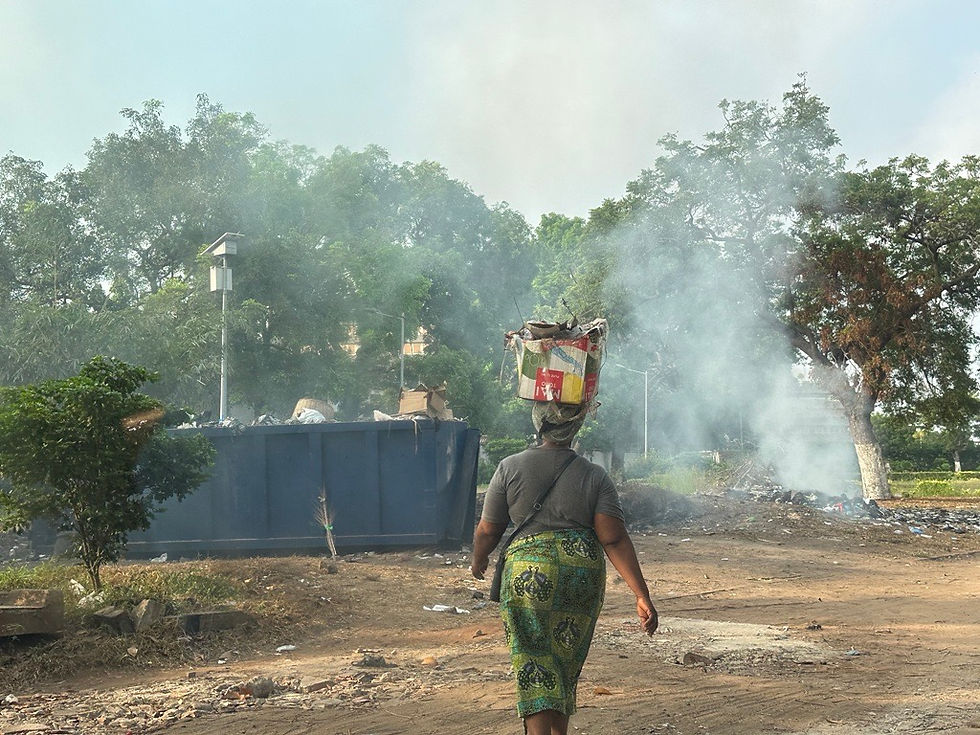
The waste sector is a major contributor to global methane emissions, accounting for approximately 20% of this harmful short-lived climate pollutant (SLCP), stemming from humans. Inadequate solid waste management (SWM) practices, such as open dumping and burning, exacerbate environmental, economic and health challenges, while increasing greenhouse gas (GHG) and SLCP emissions.
Togo has shown strong ambition in reducing high-impact greenhouse gases, particularly methane, through its participation in the Global Methane Pledge and the ambitious goals set in its current Nationally Determined Contributions (NDCs), which include a 32% reduction in methane emissions and a 28.1% reduction in waste sector GHGs by 2030.
Key waste sector measures outlined in its NDCs include:
Improved landfill management
Increased waste valorization through composting
Enhanced collection systems to reduce open burning
To advance these efforts, the Recycle Organics Program—led by the Center for Clean Air Policy (CCAP) and ImplementaSur—in collaboration with the Ministry of Environment and Forest Resources (MERF), and with support from the Climate and Clean Air Coalition (CCAC), developed two key policy tools aimed at reducing SLCP emissions from solid waste. Both tools have been approved and endorsed by the national government.
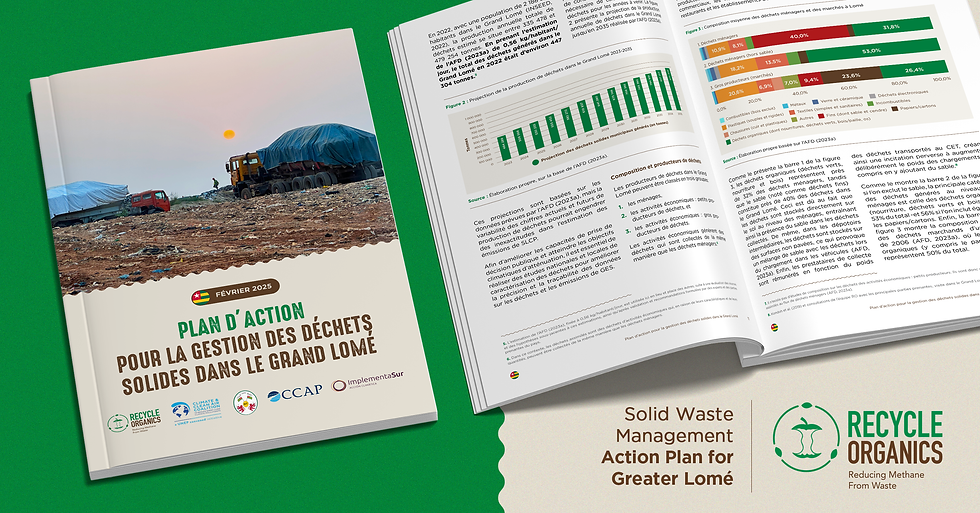
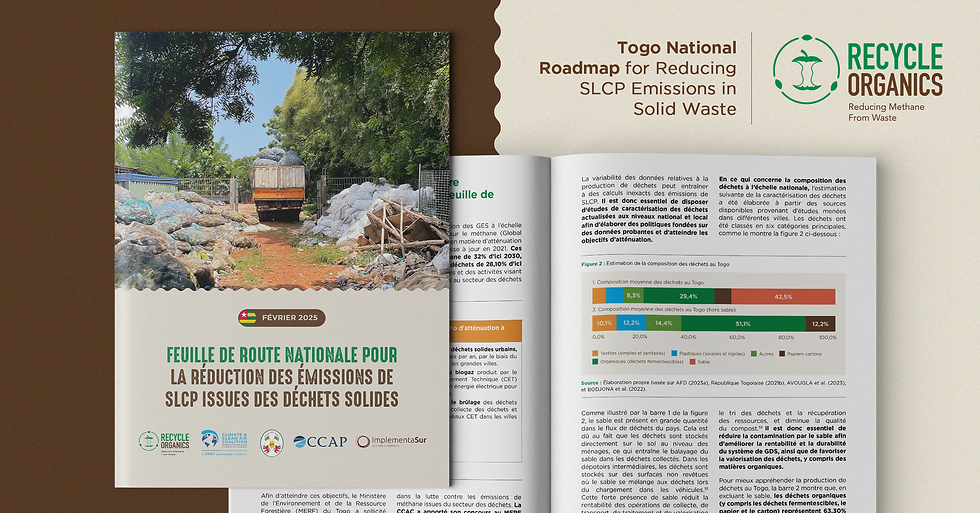
Togo, a Regional Leader in advancing methane reduction in the Waste Sector
Sub-Saharan Africa, including Togo, faces significant SWM challenges, characterized by rapid increase in waste generation —at least half of the waste stream consists of organic material— and limited collection and disposal infrastructure. Nearly 60% of households in Togo lack proper waste disposal, and 37% of the waste is openly dumped, including in public places, making the sector a critical target for mitigation efforts. Lomé (also referred to as Greater Lomé), the capital of Togo, is crucial towards addressing these issues, due to its increasing population, economic activity and waste generation. Furthermore, Lomé bolsters stronger solid waste management infrastructure and institutional capacity compared to the rest of the country.
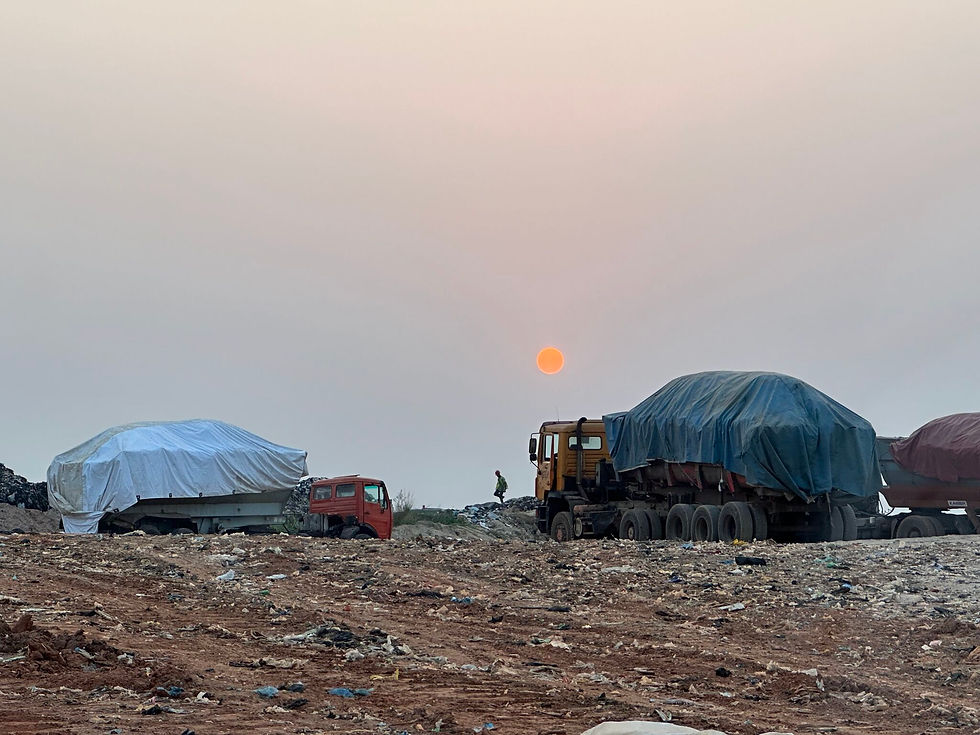
While the Action Plan is exclusive to Lomé, the National Roadmap takes a comprehensive country approach, addressing the needs of small and medium-sized towns and rural areas.
Complimentary to one another, the documents aim to establish enabling conditions for nationwide SWM improvements, with a strong emphasis on organic waste management. The development of these two reports followed a thorough local stakeholder engagement process, including a series of consultations, virtual and in-person workshops, trainings and webinars.
Together, the RO team and local constituents identified existing SWM challenges and needs and then generated a gap analysis, studying the current policies, practices and projects at both national and municipal levels to identify discrepancies between the current SWM landscape and the envisioned goals. This analysis aligned the Roadmap and Action Plan with ongoing efforts, existing expertise, investments and project pipelines. The group defined key objectives and pillars of change, proposing interventions prioritized for their SLCP mitigation potential, feasibility in Greater Lomé and alignment with existing policies. These were validated through consultations with key stakeholders.
The strategies prioritize methane mitigation while also enhancing broader SWM systems through infrastructure development, regulatory strengthening and capacity building. Recognizing the gender disparities in SWM, these policies also seek to promote women’s economic inclusion, improve working conditions and dignify daily, informal waste-related activities through financial support, training and institutional backing.
By implementing the National Roadmap and the Greater Lomé Action Plan, Togo aims to substantially improve SWM practices, reduce GHG and SLCP emissions and achieve long-term environmental and socio-economic benefits.
A Holistic Renewed Vision in the Waste Sector
In early 2024, during the initial phase of the project, national and local stakeholders collaboratively defined the key components of an ideal solid waste management (SWM) system for Togo. These inputs were then analyzed and synthesized into a unified vision. This participatory approach resulted in the collective vision that now guides the initiative:
“The Republic of Togo will transform its waste management sector, investing in proper management for waste to be transformed into a valuable resource contributing to economic growth, public well-being and improved air quality. This transformation will promote job creation and the development of sustainable products, fostering a circular economy that benefits both the environment and society. As a result, Togo can emerge as a model of waste management in West Africa.”
Challenges and Recommendations for Togo to Improve Organic Waste Management
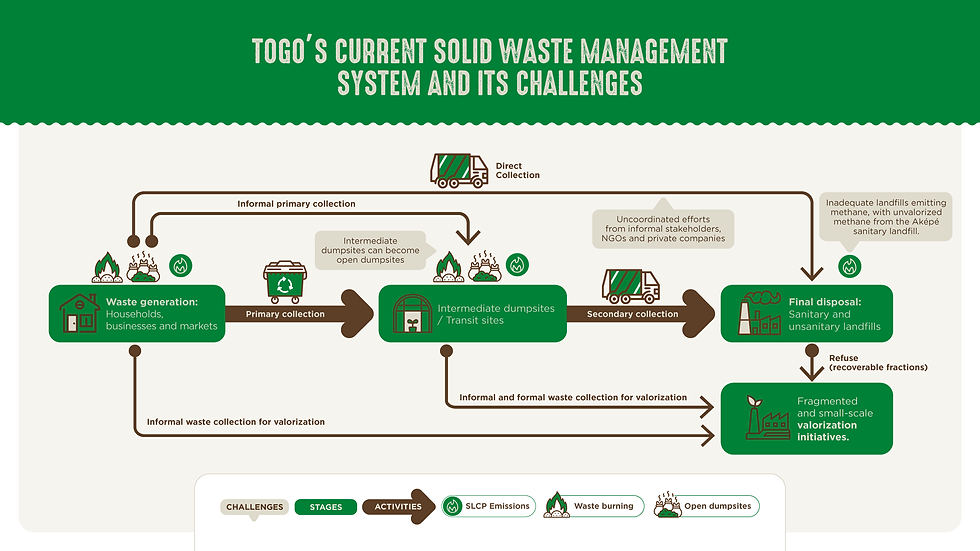
Read More
SWM in the country is hindered by a fragmented institutional and regulatory framework, with unclear roles among various public, private and NGO actors. Although laws outline responsibilities and financial mechanisms available, enforcement and coordination remain weak. Data collection is a significant issue —there’s no reliable national waste data, and the lack of integration with climate data systems hampers effective monitoring of methane and SLCP emissions. Organic waste makes up the majority (63.3%) of waste at the national level, largely from produce markets and rural areas, where recovery opportunities like composting and biogas are underutilized. High sand content in waste further challenges collection and valorization efforts.
Waste collection and disposal services are highly uneven across regions. While Lomé has a more structured, though still inefficient, system, intermediate and smaller municipalities often rely on informal dumping and burning due to a lack of infrastructure. Less than 1% of waste is composted nationwide, despite organic waste dominance, and valorization is mainly led by informal and under-supported actors. The Aképé Sanitary Landfill, serving only the capital, is the country’s main engineered site, with other regional landfills mostly non-operational. Open burning is widespread, and limited monitoring exacerbates environmental risks. Overall, SWM development is highly unequal, with major cities receiving most investments, leaving smaller municipalities with informal and inadequate services.

Read More
The recommended actions for strengthening SWM by 2030 focus on legal reform, institutional capacity building, behavior change and infrastructure development, among other key action areas. Key priorities include creating a steering committee, enacting integrated waste legislation and establishing standards and incentives for composting. Capacity building is central, with targeted training for public servants on sustainable solid waste management practices, monitoring and reporting and MRV (measurement, reporting, verification) systems. Public awareness campaigns, school curricula and community engagement aim to reduce open burning and promote sorting at the source. These efforts are supported by the development of national programs to encourage sustainable practices and public-private partnerships (PPPs).
On the operational front, the strategy emphasizes upgrading infrastructure through dumpsite rehabilitation, the integration of informal workers, sand reduction in waste and strengthening of monitoring and enforcement capacities regarding open dumping and waste burning. Investment in organic waste recovery, particularly composting and energy valorization of landfill gas, is paired with efforts to formalize financing mechanisms, introduce tax incentives and recognize municipal leadership in SWM. A strong push is made to enhance data systems and monitoring capabilities, essential for transparency and climate impact tracking.
Overall, the Roadmap outlines a phased, collaborative approach led by government entities and supported by NGOs, universities and the private sector to transition to
ward a sustainable and climate-resilient SWM system.
Challenges and Recommendations for Lomé to Improve Organic Waste Management

Read More
SWM in Lomé faces significant institutional, operational and environmental challenges. Responsibilities are shared across multiple levels of government, but unclear roles and overlapping duties hinder coordination. While legal frameworks exist, enforcement is weak. Waste data collection, particularly on greenhouse gas emissions, is sporadic, limiting informed decision-making. Organic waste makes up over half of the city’s total waste, especially from households and produce markets, but valorization remains minimal. High sand content in the waste stream further complicates processing and reduces efficiency. Waste collection is uneven, with coverage ranging from 12-75% across the city, and intermediate transfer sites are often ill-suited, lacking adequate infrastructure, leading to open dumping and burning.
Recycling and composting are limited, with most recovery driven by informal actors who lack government support or integration into the formal system. Final disposal at the Aképé Sanitary Landfill is inadequate, and while a landfill gas-to-energy (LFGE) project is planned, it has stalled. Open dumping and burning remain widespread, with 37% of the waste burned and over 240 open dumpsites identified. Funding mechanisms are fragmented and insufficient—municipalities and operators apply inconsistent fee structures, and residents are often unable or unwilling to pay due to poor service quality and overall low incomes. These systemic issues call for comprehensive reform in regulation, infrastructure, public engagement and financial models.

Read More
The Action Plan for Lomé’s SWM outlines a comprehensive, multi-year strategy to improve legal frameworks, operational efficiency, environmental sustainability, financial viability and stakeholder engagement. Key initiatives include clarifying institutional roles and updating national SWM legislation, optimizing waste collection and transfer systems, formalizing pre-collection actors and enhancing workforce capacity. Actions also target reducing open dumping and waste burning through enforcement and site closures. Additional steps include promoting a circular economy by implementing source-segregated waste collection, developing organic waste facilities and advancing a LFGE project.
Financial sustainability is addressed through the design of an integrated SWM fee system backed by baseline and cost studies, regulatory decrees and phased implementation. Capacity-building programs aim to equip public servants and institutions with the skills for effective SWM, while awareness campaigns and pilot programs encourage household composting and source segregation. Data collection and monitoring systems will be strengthened through clear role definitions, harmonized methodologies, digital tools and training. The plan is coordinated by key national and municipal entities, with support from NGOs, academia and the private sector. This includes both low-cost and high-investment actions phased over five years.
Looking Ahead – Paving the Way for Sustainable Waste Management in West Africa
The effective implementation of Togo’s National Roadmap and Lomé’s Action Plan hinges on a strong, coordinated institutional framework led by the Ministry. As the central coordinating authority, MERF and city officials will ensure that these documents align with national waste and climate goals. A key first step is the creation of a Steering Committee for Waste Management, which will serve as the central governance mechanism. This committee will foster inter-ministerial collaboration, monitor progress and address challenges that may arise during implementation.

To ensure long-term success, all responsible government and city agencies must integrate these strategic actions into their ongoing work plans and performance indicators. This integration will help institutionalize the reforms and prevent them from being sidelined. Looking ahead, embedding the Roadmap and Action Plan into sectoral planning and maintaining strong oversight through the Steering Committee will establish a foundation for sustained, accountable and transformative change in waste management across the country, while inspiring regional change across West Africa.
About the Recycle Organics Program
In total, RO’s project portfolio spans over 50 initiatives across 25 developing countries worldwide that could mitigate up to +31 million tons of CO2e over the next 20 years and divert more than 700,000 tons of organic waste from landfills each year, extending their useful life. The Program accomplishes this through advancing policies, building regional capacities, accelerating green projects, raising awareness and developing custom strategies and investment plans, aligned with each country’s unique climate goals.
Overall, the Recycle Organics Program helps countries take meaningful action to cut methane emissions from organic waste, a critical step in tackling climate change. By supporting Nationally Determined Contributions (NDCs) and advancing the Global Methane Pledge, the Program plays a key role in helping countries reduce waste sector emissions and meet international commitments.
Led by CCAP and ImplementaSur, with 35+ years of experience in the sector, Recycle Organics delivers significant environmental, economic and social benefits to local communities around the world.
The RO Program is also funded by Environment and Climate Change Canada, which is supporting six Small Island Developing States (SIDS) in the Caribbean and Pacific regions.
Stay Connected!
There are numerous ways to stay connected with CCAP. Follow us on X (@CCAPolicy) and on Facebook & LinkedIn.
CCAP’s mission is to support every step of climate action, from ambition to implementation. A recognized world leader in climate policy and action, CCAP creates innovative, replicable climate solutions, strengthens capacities, and promotes best practices across the local, national, and international levels to accelerate the transition to a net-zero, climate resilient future. CCAP was founded in 1985 and is based in Washington, DC.





Snow Rider offers endless snowy slopes, easy controls, and fast gameplay, making it perfect for quick breaks while still delivering exciting challenges.
Mỗi người đọc mấy trang số liệu thường có lý do riêng, với mình thì chủ yếu là xem cách họ sắp xếp thông tin. Một lần đọc bài viết trên soi cầu 247, mình thấy nội dung đi theo dạng tổng hợp lại cầu và kết quả gần đây. Đọc xong cũng chỉ ghi nhớ đại khái cách trình bày, không có gì khiến mình phải quay lại ngay.
This was an inspiring read! It’s great to see how Togo is addressing SLCP emissions through structured waste management strategies. I recently had to get blog posts written on similar sustainability topics through Paysomeone To, and it really deepened my understanding of how policy and environmental action go hand in hand.
It’s inspiring to see a clear action plan driving measurable change clarity of strategy matters in any field. When I needed to unpack layered business content, I used a Business studies exam support service via Take My Online Exam Pro. Their structured approach gave me the roadmap I needed to succeed and reduce uncertainty.
شيخ روحاني
رقم شيخ روحاني
الشيخ الروحاني
الشيخ الروحاني
شيخ روحاني سعودي
رقم شيخ روحاني
شيخ روحاني مضمون
Berlinintim
Berlin Intim
جلب الحبيب
https://www.eljnoub.com/
https://hurenberlin.com/